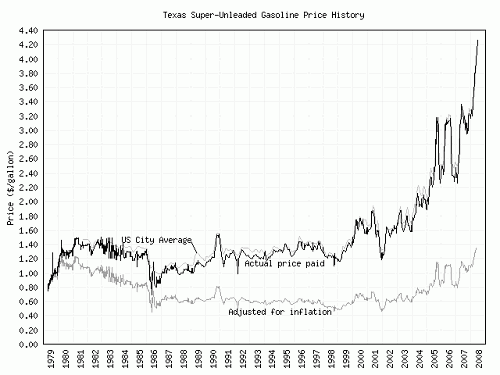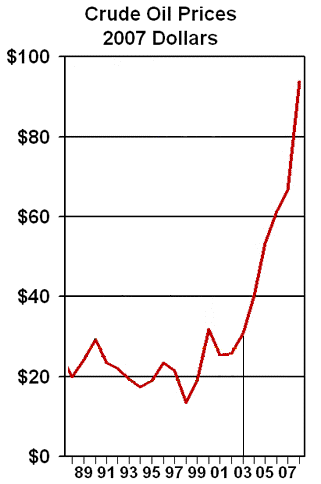|
Gas PuzzlerSoon after landing on American soil, I found myself lining up for gasoline for 45 minutes, and that told me something was wrong with this land of free enterprise. When all the establishment media I could lay hands on failed to explain the shortage, I knew it was worse. When only a fringe magazine (The Libertarian Review, July/August 1979, with outstanding articles by D.T. Armentano, Murray Rothbard, Roy Childs et al) offered a credible explanation, I learned where to go for more good sense on all manner of anomalies; and so in due course I encountered Strike The Root. This year, there aren't any gas lines (though stay tuned), but the price seems outrageous; and in particular, its rate of increase recently has been amazing. Once again, establishment media offer no credible explanation; reports of gas prices often follow weather information, which seems quite appropriate since they have little idea what causes either. But this time, there's a difference: I've not yet seen a fully credible explanation of what's going on even in libertarian literature. That's a first. Fair warning: This article doesn't explain it either. Instead, I thought to review a few of the partial insights given recently by some of the economists who know which way is up--including Professor Armentano, for whom I have a lot of time. And first, let's take note of the facts of the matter: how bad is it, exactly? Probably not quite as bad as it seems. Two years ago I enquired What Gas Crunch? and reproduced the valuable chart published by a public benefactor in Texas over the modest title "Random Useless Information" and his recent update appears below. Yes, the price of a gallon is now higher than at any time since 1981, in real terms - about $1.35, in 1979 dollars. So we do, now, have a real surge. Why?
Dom Armtentano wrote about this on LewRockwell.com a few weeks back, but he focused mainly on the future: What will prices most likely do during the next year? He said they will fall, and gave an excellent rationale. In summary, the present high price of oil is stimulating producers to uncap wells that were uneconomic when prices were lower, and so market stimuli will work--he expects a drop to about $80/barrel by early next year. I certainly hope he's right. His account of why it is currently over $130 is more sketchy; he says 20% of the hike comes from supply disruptions and 10% from the dollar debasement and while he may be right, those look a bit like intelligent guesses and don't correlate well to the speed of the hike; I wish he'd spent more time analyzing the causes more systematically. If the market can work in the manner he expects, I am left wondering why it has not already worked; why did these marginal producers not rush to take off their mothballs last November when the price sprinted past $80? Markets always work, of course, but only when allowed to; governments frequently prevent them working, by force. In fact, that's all that governments ever do--it's their distinguishing feature. And if government(s) have prevented markets working so far for this commodity, what's to stop them continuing to do so? Doug Casey offers a free, 5-part course in oil economics--well worth studying--and while his focus is on how best to invest in the black stuff, he makes the argument that oil prices have risen because all the low-hanging fruit has now been picked; a similar theme was struck here this month by Glen Allport. Plenty of oil is left, but it will cost more to extract. Casey relies in its Part 1 on some reasoning by M. King Hubbert of Peak Oil, said to prove that US supply capability reached a peak in 1970 and that of the world, in 2006. Some impressive bell-curves are shown, but to my mind there is a degree of circularity in the reasoning, and even if it is sound, it still doesn't explain the speed of the recent price hike. Oil may indeed be a good long-term investment, if one has anything left over to invest after paying fuel bills, but I doubt that this really answers our question. If I understand Casey right, the formula he gives for the bell curve (P/Q vs. Q) is not correct, and there's a technical critique of Hubbert's theory here. In any case, to measure the leveling-off of production doesn't tell us why it leveled off; was there no more oil to extract? Had its price reached a level beyond which competing products eliminate demand? Did government regulations forbid drilling offshore, or prohibit new refinery construction, or limit oil use lest the globe be further warmed? Did terrorists bomb pipelines? Were there no more oil tankers afloat? Any number of factors could be at play.
I did say earlier that this article comes without answers--but in case anybody wants to know, here's my tentative opinion. I will change it as soon as new facts or reasoning show it's mistaken. The premise is that the rate of oil price increase proves that no free market is operating. It has doubled in nine months, during which time all players have repeatedly said with straight faces that there is no abnormal pressure of either supply or demand. During those nine months the Iraq War has cooled a bit, not heated up. So, when the market isn't working, there's no point in pretending it is; we must look elsewhere for causes--to government(s), which alone have the power to distort and manipulate markets. Which government entities have the motive, means and opportunity to inflate oil prices? Cui bono? There's no shortage of well-motivated governments. Bush and his friends have managed to aggravate at least four major oil producing states in different ways: Iran, Iraq, Venezuela and Nigeria--and Russia, too, is a bit grumpy. If they have the means to hurt the United States, they will. Do they? It's not obvious to me that they do. The oil market is worldwide and rather fungible; they can't easily target one group of customers with a selective high price. Saudi Arabia, Kuwait and the other Gulf suppliers are allegedly friendly, as is Mexico, Norway, the UK and Canada--so presumably they would not wish to hurt us anyway, especially as the former have few places to put extra money except into US assets; so what would be the point of raising prices so high as to damage those assets in a resulting recession? I don't see any bono there. Could there, finally, be a manipulation by powerful internal groups, allied with government? How about the oil companies, the cartel that actually extracts, refines and distributes the stuff. Might they be using their clout with government to hike prices? They are certainly drawing ample benefit, as many a left-wing commentator has whined, and their connections to the Bush family are well known. But it would be extraordinary if the cartel had held the (increasing) line on prices this long, for the instant any cartel makes any agreement, every individual member has a powerful motivation to cheat and break it. Two other eminence grises come to mind. One is the Green Lobby, which is desperate to drive us all back to medieval living standards by curbing consumption of carbon fuels (and any others likely to prolong our prosperity). It's popular with the Dems, but I'd have thought its influence with the Mob Family presently in power was minimal. Okay, so what about the Republican Party, or some group within it like the reigning Neocon faction? There, at last, may be a possibility; they have motive, opportunity and perhaps the means. The motive is that if the Dems win a landslide in November, they (the Neocons) are history; their name will be reviled for a generation. However, by manipulating a wild rise in the price of gas today, which hits every voter hard, the bleating of their Dem rivals about conservation and global warming and oil-company greed will fall flat; idealism may count for a little with America's voters, but will go up in a puff of oily smoke when gas costs $4.50 and impossible winter fuel bills loom. They will turn, however reluctantly, to a John McCain and his dull, steady-as-we-go promises about finishing what "we" started in Iraq, stabilizing the Middle East, opening ANWR and allowing offshore drilling, etc.; the scintillating but vacuous oratory of his rival will be forgotten in the mad scramble for something to keep them warm and mobile. As McCain's poll numbers rise, I would not be at all amazed if pump prices were to fall. |

